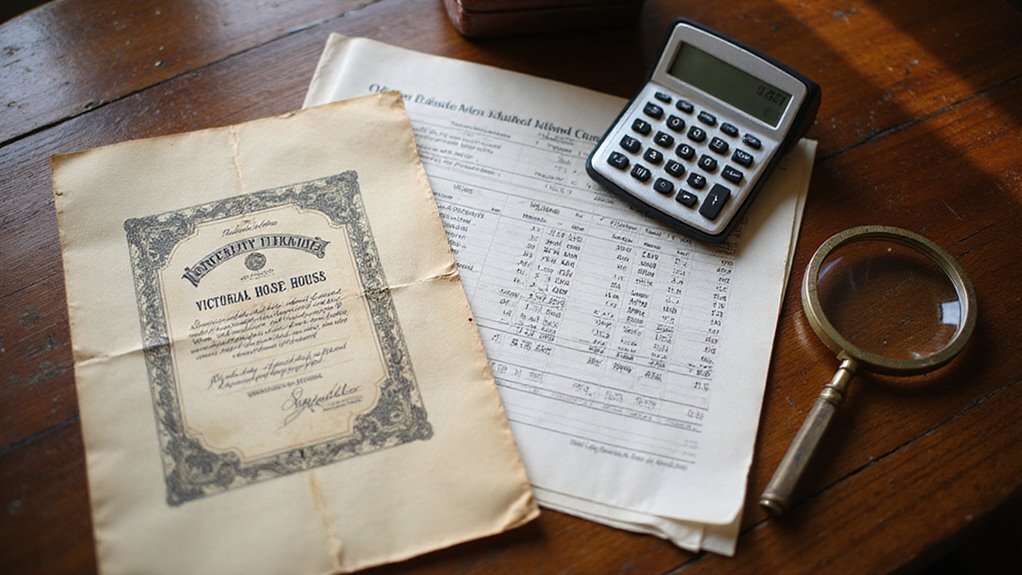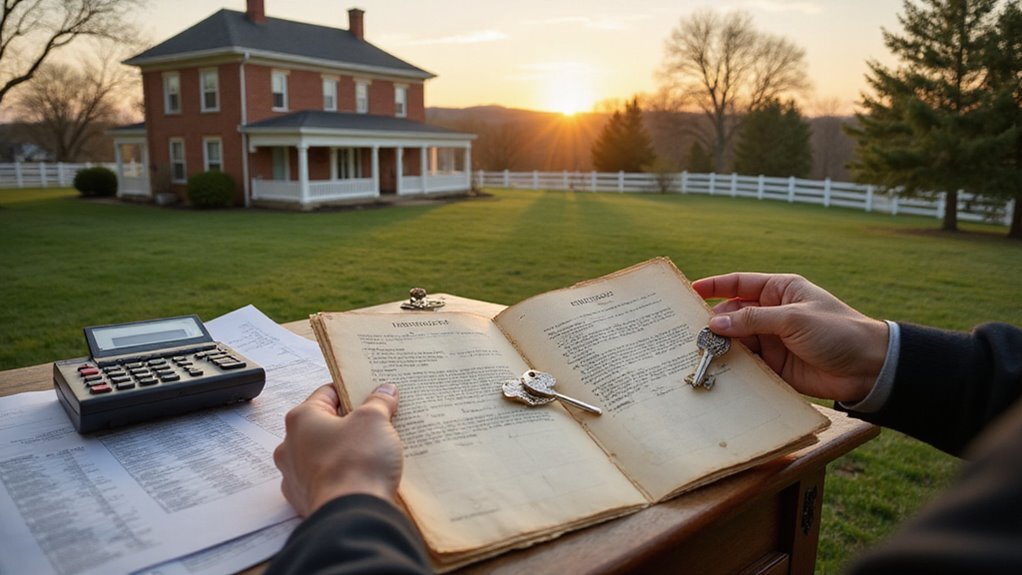Navigating the tax implications of inherited property keeps many beneficiaries awake at night. Estate taxes and capital gains can take a significant chunk of your inheritance if you don’t understand the rules. Without proper knowledge, you might end up paying unnecessary taxes or missing crucial deductions and exemptions. Fortunately, understanding the stepped-up basis rule and available tax strategies can help protect your inherited wealth.
Thanks to the stepped-up basis rule, inheritors typically don’t pay capital gains tax on property appreciation before inheritance. The property’s value resets to fair market value at the time of inheritance, and you only pay taxes if you sell above this new basis.
This blog explores everything you need to know about capital gains taxes on inherited property.
Key Takeaways
- Capital gains tax applies only on the appreciation of inherited property after the date of inheritance.
- The property’s basis is stepped-up to its fair market value at the decedent’s death, minimizing gains.
- Gains are calculated by subtracting the stepped-up basis from the sale price, minus deductible expenses.
- Federal capital gains rates depend on income, ranging from 0% to 20%, with long-term holdings qualifying for lower rates.
- Kentucky follows federal rules and does not impose additional state taxes on gains from inherited property.
What is Capital Gains Tax on Inherited Property?

Capital gains tax applies when you sell inherited property for more than its inherited value. The tax rate ranges from 0% to 20%, based on your income level. Your property’s tax basis gets adjusted to its fair market value on the date of the previous owner’s death. This adjustment often reduces your potential tax burden significantly.
A clear understanding of your inherited property’s stepped-up basis helps minimize tax obligations. Smart timing of property sales and proper documentation of the inherited value ensures optimal tax outcomes. Therefore, proper planning allows you to maximize your inheritance benefits.
How Does the Stepped-Up Basis Work?
The stepped-up basis adjusts the property’s value to its fair market value at the decedent’s death, reducing your capital gains tax if you sell later. To do this, you need to determine the property’s current market value, which becomes your new basis. This way, only gains above that value are taxed, saving you money.
Definition of Stepped-Up Basis
A stepped-up basis is the adjusted value of inherited property to its fair market value at the owner’s death. The new basis becomes the property’s fair market value on the date of death. Capital gains taxes apply only to increases in value after inheriting the asset. This adjustment provides significant tax advantages for heirs.
The tax benefits stem from avoiding capital gains on appreciation that occurred during the original owner’s lifetime. Heirs must document the stepped-up value through professional appraisals or market analysis. Furthermore, proper valuation helps ensure accurate tax reporting.
How Stepped-Up Basis Reduces Capital Gains Tax
Stepped-up basis reduces capital gains tax by resetting an inherited asset’s value to its fair market price upon death. A beneficiary pays tax only on gains that occur after inheriting, not on the total appreciation since purchase. This tax benefit can save heirs significant money when selling inherited property. The cost basis adjusts automatically to match the asset’s value when received.
Beyond these savings, property heirs face lower tax burdens when transferring generational wealth. Furthermore, this benefit applies to various inherited assets like stocks, real estate, and businesses.
Determining Fair Market Value
Fair market value comes from expert assessment of what property would sell for between willing buyers and sellers. Professional appraisals determine FMV at the time of death for inherited assets. This value establishes your new tax basis, which affects future capital gains.
In the real estate market, recent comparable sales offer reliable value indicators. Local market conditions and property features directly influence pricing decisions. Multiple data points create accurate valuations.
Current tax laws allow heirs to minimize capital gains through stepped-up basis calculations. This benefit helps reduce tax burdens when selling inherited property later.
When Do You Pay Capital Gains on Inherited Property?
Capital gains tax applies when you sell inherited property above its stepped-up basis value. The stepped-up basis equals the property’s fair market value on the date of the previous owner’s death. A property inherited at $300,000 only incurs taxes if sold above this amount. The federal long-term capital gains rates determine your tax obligation.
To minimize tax impact, obtain a professional appraisal to establish the correct stepped-up basis. Additionally, keep detailed records of any improvements made to the property after inheritance.
How to Calculate Capital Gains Tax on Inherited Property?

To calculate your capital gains tax on inherited property, start by determining the stepped-up basis, which is usually the property’s fair market value at the decedent’s death. Then, subtract this basis from the sale price to find your gain, considering any deductible expenses like selling costs. Finally, apply the appropriate federal tax rate—0%, 15%, or 20%—based on your taxable income.
Determining Your Tax Basis
Tax basis equals the fair market value on the date of death for inherited property. The IRS uses fair market value at death as your cost basis for future capital gains calculations. This step-up eliminates taxes on appreciation that occurred during the original owner’s lifetime. A professional appraisal can establish the accurate value.
Beyond that point, any additional expenses must be tracked separately. Capital improvements add to your basis, while repairs and maintenance do not. Your gain or loss calculation starts from this stepped-up basis when you sell the property.
Calculating the Gain
The gain equals the sale price minus the stepped-up basis. A stepped-up basis represents the property’s fair market value on the date of death. The tax applies only to profits above this basis amount. Capital gains tax applies when you sell the property for more than its stepped-up basis value.
At the same time, no tax applies to sales below the stepped-up basis. The IRS considers these transactions as losses rather than gains. This simple calculation method ensures accurate tax reporting for inherited properties.
Applicable Tax Rates
Capital gains tax rates depend on your total taxable income. Federal rates are 0% for income up to $44,625, 15% for $44,626-$492,300, and 20% for income above $492,300 (2023 figures). Kentucky residents pay both federal and state rates on inherited property gains.
A clear understanding of these rates enables better tax planning. The tax applies only to profits made when selling inherited assets above the stepped-up basis. Proper documentation helps avoid tax-related complications.
Moreover, taxpayers must report all capital gains on Schedule D of Form 1040. Professional guidance can ensure accurate calculations and timely payments.
Deductible Expenses
Deductible expenses reduce the taxable gain on inherited property sales. Common deductions include real estate agent fees, attorney costs, home repairs, and property taxes paid. You must keep receipts and documentation for all claimed expenses.
Property improvements that boost value qualify as deductible costs against capital gains. A new roof, updated HVAC system, or renovated kitchen can offset tax liability. Moreover, closing costs and transfer fees decrease the final taxable amount.
Before selling, gather all expense records from the inheritance date forward. The IRS allows deductions only for costs incurred during your ownership period.
What Are the Exceptions and Exemptions?
You may qualify for certain exceptions and exemptions that reduce your capital gains tax liability. For example, the primary residence exclusion lets you skip taxes on gains up to $250,000 to $500,000 if married) if you used the property as your main home. Additionally, options like a 1031 exchange or special rules for surviving spouses can further impact your tax situation.
Primary Residence Exclusion
The IRS lets homeowners avoid taxes on profits from selling their main home. You can exclude up to $250,000 in capital gains as a single person. Married couples may exclude up to $500,000.
To qualify, homeowners must meet specific requirements. The property must serve as your primary residence for at least two years within the five-year period before sale. Special exceptions exist for health issues or job relocations.
Moreover, business use or rental history affects eligibility. The IRS restricts multiple exclusion claims within a two-year timeframe. Tax benefits help offset moving costs while protecting your investment gains.
1031 Exchange Options
1031 Exchange Options allow property owners to defer taxes when swapping real estate. A 1031 exchange lets investors trade similar properties while postponing capital gains taxes. The IRS requires these exchanges to involve like-kind properties held for business or investment purposes.
Proper timing and qualified properties make these exchanges successful. Properties must be identified within 45 days and acquired within 180 days of selling the original property. Moreover, an exchange facilitator must handle the transaction.
To that end, real estate investors can preserve wealth through strategic property exchanges. This tax strategy works best for investment properties, not personal residences or fix-and-flip ventures.
Special Considerations for Surviving Spouses
Surviving spouses receive special tax benefits and protections for inherited property. A full step-up in basis allows the property value to reset to its fair market value at death. This reset eliminates capital gains tax on appreciation that occurred during the deceased spouse’s lifetime.
Two key provisions help minimize taxes further. First, jointly owned property may qualify for a complete basis step-up. Second, the primary residence exclusion can shelter up to $500,000 in gains.
Moreover, these tax advantages extend beyond the initial inheritance period. Smart planning with these benefits preserves more wealth for the surviving spouse’s future needs.
How Can You Minimize Capital Gains Tax?
You can reduce capital gains tax by timing your sale strategically and making necessary home improvements to boost the property’s value. Offsetting gains with losses from other investments also helps lower your tax bill. Additionally, consider using installment sales to spread out income and minimize immediate tax implications.
Timing Your Property Sale
The best time to sell property depends on market conditions and your tax situation. Property sales after 12 months receive favorable long-term capital gains tax rates of 0%, 15%, or 20%. A strategic sale during a lower-income year can reduce your tax burden significantly. The market season also matters for optimal pricing.
Moreover, homeowners can exclude up to $250,000 in gains from their primary residence ($500,000 for married couples). This tax break requires living in the home for two of the past five years. Smart timing combines these tax advantages with strong market conditions for maximum profit.
Making Home Improvements
Smart home improvements add value to your property and boost your living comfort. A new kitchen remodel can recoup up to 80% of its cost when you sell your home. Modern bathrooms, energy-efficient windows, and upgraded flooring make excellent investments.
Proper documentation of improvement costs helps reduce capital gains tax when selling inherited property. The IRS allows you to add these expenses to your cost basis. A higher basis means lower taxable profit at sale time.
Keep all receipts and contracts for your upgrades. Photos before and after improvements serve as valuable proof. These records protect your investment and ensure maximum tax benefits.
Offsetting Gains with Losses
Capital losses can directly reduce your capital gains and lower your tax burden. Investment losses will offset capital gains dollar-for-dollar up to $3,000 per year. Your financial advisor can help match losses against gains for optimal tax benefits.
Moreover, smart timing makes a difference in tax outcomes. The IRS allows you to carry forward excess losses to future tax years. This flexibility helps spread out your tax advantages.
Proper documentation strengthens your position. All receipts for property improvements add to your cost basis and reduce taxable gains. A clear paper trail protects your interests during tax season.
Installment Sales Strategy
An installment sale splits property sale payments over multiple years to reduce immediate tax burden. Capital gains taxes apply only to payments received each year instead of the full amount upfront. This method creates a steady income stream while lowering yearly tax obligations. A well-planned installment agreement can make property transfers more manageable.
As a result, sellers can maintain better cash flow and tax efficiency. The IRS allows flexibility in structuring payment terms to match financial goals. Smart payment scheduling helps both buyers and sellers achieve their objectives. Before proceeding, qualified tax advisors should review your specific circumstances.
What Are State-Specific Rules in Kentucky?

Kentucky follows standard federal tax regulations with minimal state-specific rules for inherited property. The state does not collect inheritance or estate taxes. Capital gains from inherited property sales must align with federal regulations. Property sellers need to report real estate transactions to Kentucky tax authorities.
Beyond these basic requirements, Kentucky keeps inheritance rules simple. The federal stepped-up basis rule applies when calculating capital gains taxes. This approach makes asset management straightforward for beneficiaries.
Moreover, the absence of additional state taxes benefits Kentucky residents who inherit property. These simplified rules help heirs handle inherited assets with minimal complications.
Conclusion
Understanding capital gains tax on inherited property requires careful consideration and professional guidance to make informed decisions. At OC Real Estate, we help homeowners navigate these complex tax implications. We specialize in buying inherited houses throughout Louisville and neighboring Kentucky cities.
If you inherit a property, the stepped-up basis can significantly reduce your potential tax burden when selling. We often recommend evaluating the market conditions before making hasty decisions. Our team can assist you in determining the best timing for selling your inherited property.
Working with experienced real estate professionals can make the inheritance process smoother and more financially beneficial. We at OC Real Estate understand the local Kentucky market dynamics and inheritance tax regulations. Our cash buying process helps sellers avoid lengthy holding periods that could impact their tax obligations. We encourage heirs to explore their options and understand their tax responsibilities before making final decisions.

